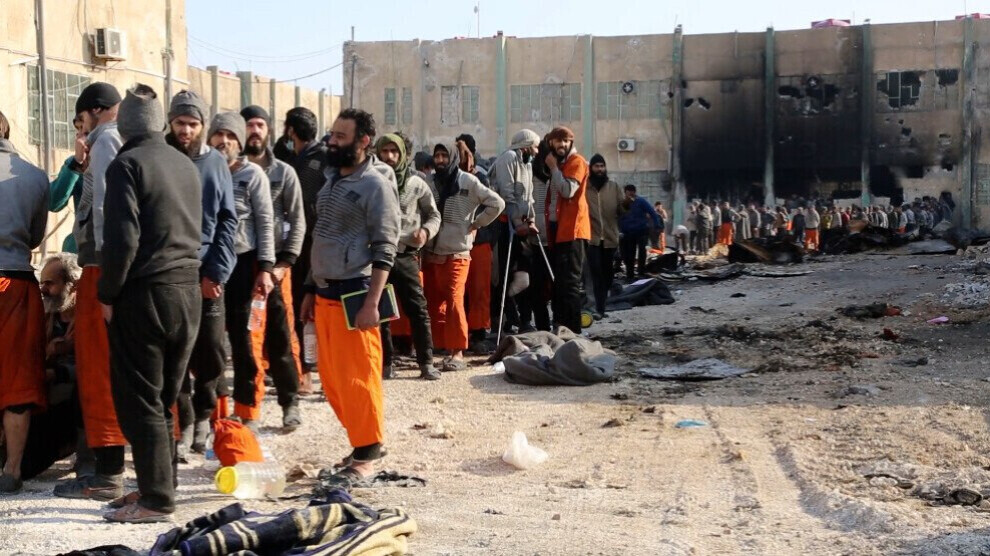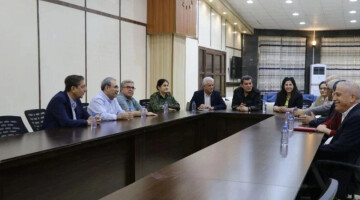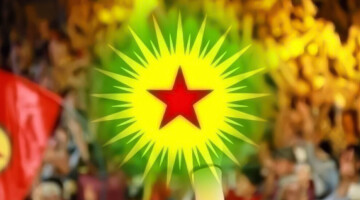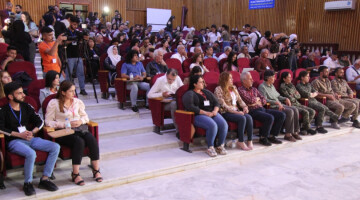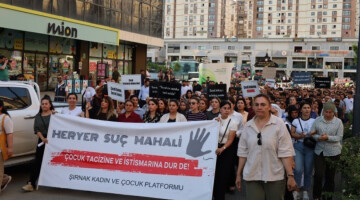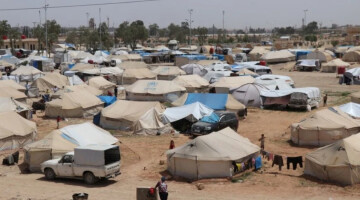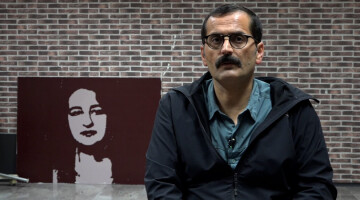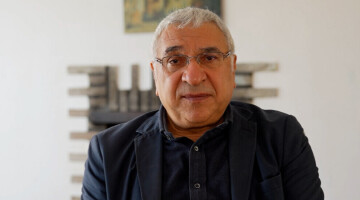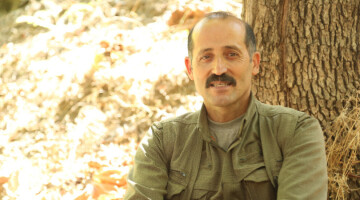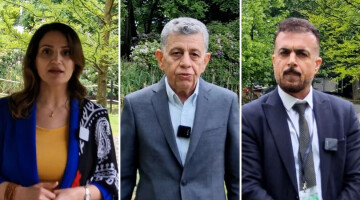Xalid Îbrahîm, member of the Foreign Relations Department of the Democratic Autonomous Administration of North and East Syria (DAANES), spoke to ANF about the problem with ISIS members and families held in the region.
Xalid Îbrahîm stated that the autonomous administration has fulfilled all its responsibilities in the fight against ISIS and that the international community is also responsible for this and should act with this responsibility. "A great struggle was waged by the people of this region to end the threat posed by ISIS terrorism all over the world. Finally, in 2019, ISIS' presence in the region was geographically ended. However, ISIS continues to exist in terms of organisation, idea and mentality," Îbrahîm said, adding that for this reason, since 2019, they have continued to fight against the remnants of ISIS, its secret cells, those who bear the ISIS mentality and try to develop it in society.
Pointing out that there are thousands of ISIS gangs in prisons and thousands of ISIS families in Hol and Roj camps, Îbrahîm said, "We know that these gangs in prisons are the most radical and dangerous elements of ISIS. Again, Hol Camp is like a bomb ready to explode. Those in this camp continue their daily organisation and activities. Now, the Autonomous Administration, with the means at its disposal, has difficulties both in establishing complete control over the camp and ensuring its security, and in meeting all the needs of the camp. For this reason, the Autonomous Administration says that the responsibility for this situation lies not only with the Autonomous Administration, but also with the international community and that the necessary action must be taken together. In fact, the first-degree responsibility falls on the international community. The Autonomous Administration has done its part and is still doing it. For this reason, as the Autonomous Administration, we constantly repeat. The ISIS problem should be considered as an international terrorism problem and should be evaluated as a whole."
Pointing out that some countries want to take their citizens, Îbrahîm said, "For this, the Autonomous Administration is providing all the necessary assistance. However, there are some difficulties for us. There is the security aspect of this issue, and there is the identity aspect. As it is known, there are citizens of about 50 countries in Hol and Roj camps. We have the problem of identifying them. The number of children is very high and these children have many identities. We have the problem of identifying them with documents and security problems arise. All these are problems for us. That is why the Autonomous Administration is in constant endeavour and work for a general solution. It is not enough just to send them home. Just as an international coalition has been established for the war against ISIS, an international coalition must be reconvened for this problem as well. Only in this way can the problems with those left behind by ISIS be solved.”
The return alone will solve the problem completely
Îbrahîm continued: “Thousands of people have lost their lives in northern and eastern Syria. The people here are demanding their rights for the prices they paid and the people they lost. Thousands of people were massacred by ISIS, more than 12 thousand martyrs were killed in these lands. There are 25 thousand veterans. Thousands of children were orphaned. All these are problems that lie ahead of the Autonomous Administration to be solved. In this sense, only the return of these people to their own countries is not a situation that will solve the problem completely. From the beginning, the Autonomous Administration has repeatedly stated that a court should be established and these people should be tried in these courts. It is out of the question that they evade a trial. If these people will not be tried, if all these ISIS members will not go through a trial despite all the crimes they have committed, then we cannot talk about ending ISIS completely. In this sense, these people need to be tried in a fair and open court to be established at the international level. As long as the rights of the people who have suffered, paid a price and suffered losses due to the attacks of ISIS are not sought, the problems will grow and the crisis will deepen day by day."
'Some countries only want to take children'
Xalid Îbrahîm stated that the countries that agreed to take their citizens only wanted children and the Autonomous Administration could never accept this. He continued: "Last year, about 15 countries requested to take their citizens and with our help, they were sent to their countries. This year, we received requests from 4-5 more countries. They mostly want children. They have a policy of their own. However, we say that we will not separate mothers and children from each other. We absolutely do not accept that only children are taken. We fully support the return of those who have not been active in ISIS activities, have not been involved in crimes or have not taken part in the massacre of people to their own countries. In the delivery of children, we do not accept the delivery of children by separating them from their mothers in any way except in some humanitarian situations. If they are orphans or sick, they can be treated in their own countries. In these cases, we hand over the children. But we do not accept such a thing in different situations. Some countries state that they can only take children, that this is their policy and they only want children. This is a difficult situation for us and it is not acceptable.
On the other hand, many Iraqi citizens had taken refuge in Rojava due to the ISIS war and most of them were staying in Hol Camp. This situation is actually a problem in itself. Because most of them do not want to go back. Not only Iraqis, but also citizens of other countries do not want to return. Because they still have the ISIS mentality in their minds. They still believe that ISIS will return one day and establish its power."
Stating that the attacks of the Turkish state and the confusion that some forces in the region are trying to create in Dêrazor pose a risk for the returning families, Xalid Îbrahîm said, "There are not only foreign migrants in the Hol Camp. There are also Syrian citizens. Some of them are those who fled from the areas of the government in Damascus. Some of them fled from war and oppression. There are also those who came from occupied areas. In addition, there are those who came from Autonomous Administration areas due to the ISIS war. For example, there are many families from Deir ez-Zor. There were very wide discussions on this. There was a lot of demand from the people in that region and especially from the tribes. Many tribal leaders from that region demanded from the Autonomous Administration that these people return to their lands. Some families have expressed regret, some families have separated from each other and want to return to their families. Some of them are women and children. For all these reasons, the Autonomous Administration has ensured the return of these people by providing the necessary security measures and living conditions to prevent them from falling back into the environment of these terrorist organisations. Of course, there are still some risks. Because there are problems in the Deir ez-Zor region. Both ISIS and regional forces are engaged in activities to create confusion in this area and clashes break out from time to time. In other words, it is an area with partial security problems. Therefore, there is a possibility that these returns may sometimes be dangerous. However, some institutions have been assigned to monitor this at this point. Because both the society and the returning families have concerns. From time to time, there are attempts by ISIS cells against these areas. The attacks and threats of the Turkish state against Rojava, of course, both enable and encourage ISIS to organise itself once again as an international terrorist threat.
There is already an increase in their attacks against the Northern and Eastern Syrian regions day by day. They have sleeper cells. Although the assistance of the international coalition still continues, internal security forces and military forces are constantly on the move. However, they are still trying to organise themselves. For this reason, as the autonomous administration, we are constantly saying that this crisis, the problem of international terrorism, cannot be solved by leaving it to the autonomous administration alone, that everyone must do their part in this matter. Whether it is international institutions, or humanitarian and legal institutions, all of them must deal with this file. In this way, this problem should be addressed as a project both in terms of granting the rights of the people who have been victims of the ISIS war and in terms of security, military, political and service, and this should be done jointly with the autonomous administration and the international community. Only in this way can the problem of terrorism be addressed as the most fundamental problem that stands in the way of solving the Syrian crisis today. And unless this problem is addressed and solved in all its aspects, it is not possible to address and solve the Syrian crisis in general.
Families from Deir ez-Zor are citizens of this country. They are the people of this land. In this sense, they are not being handed over, they are returning to their own places. In other words, it should be considered as a return. They stayed in the Hol camp for a while. The necessary investigations and determinations were made. Efforts are made to ensure the return of those who are not involved in crime and who do not have a criminal record with the help of the service institutions and the tribal leaders in the region. But some families demand to return and some families do not want. That is why we say that this is an international problem.
Because these are the remnants of ISIS, the problem with those with the ISIS mentality is an international problem. In this sense, the international community must now seek a radical solution to this matter. It is not an issue that can be solved only in the military and security dimension. Now, we need to understand this well. How did ISIS emerge and how did it develop? There was a ground for this. There was a ground that provided ISIS with these conditions and this ground must be eliminated. The grounds for ISIS to reorganise and revive itself still exist in some places. Deir ez-Zor in Northern and Eastern Syria is one of these areas. There are attempts by both regional forces and different groups to create confusion in the region and liquidate the administration. Both the international coalition and the international community should clarify their responsibilities in this regard and take responsibility.
There are families who lost their children in the ISIS war, and some families have developed enmity against each other due to the ISIS war. For this reason, the people of Northern and Eastern Syria, especially the families who lost their children in this war, are slowly reacting, whether regarding the families who have been handed over to foreign countries or the families who have returned. Because many families want vengeance for their children. They express that they want those who have been handed over to their countries or returned home to be tried in court. Therefore, the autonomous administration is in search of how to come up with a solution to this problem together with the international community.

